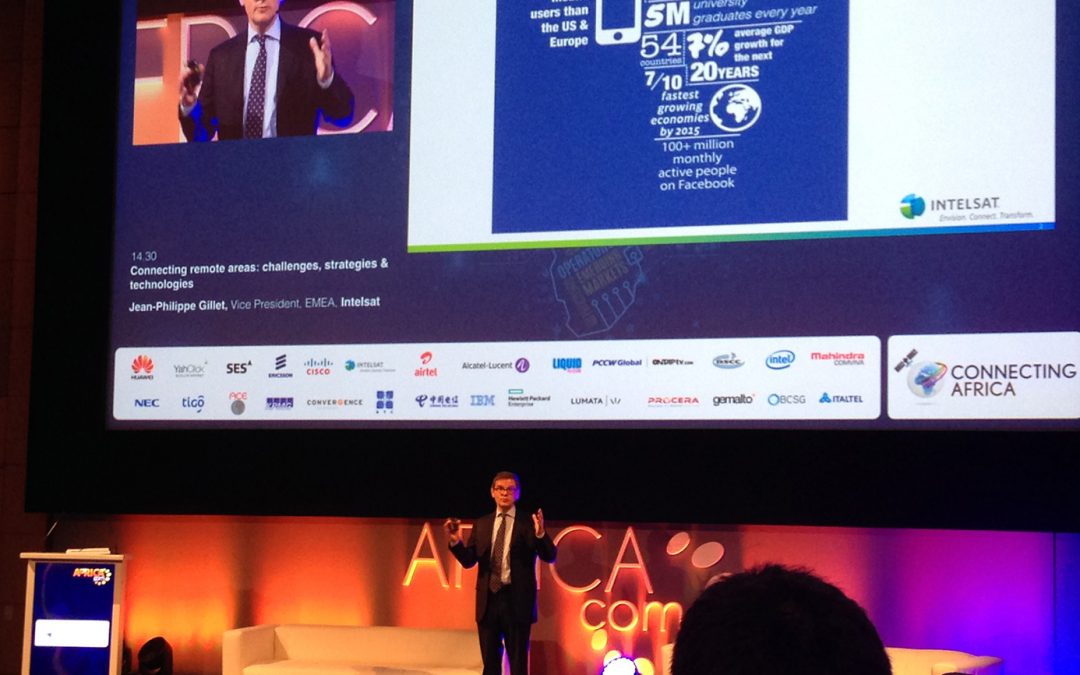The long, winding road of our Innovation Fellowship led us to Cape Town and the AfricaCom conference, the largest meeting of telecom operators in Africa. After many hours of brainstorming, funneling ideas, researching, reaching out to experts, and prototyping, our project on measuring displacement using “big data” had come down to this: interest telecommunications operators or close the innovation shop.
Each cell-phone voice call or text message leaves a digital footprint consisting of the caller identifier, the time of the call, the location of the cell tower used, and the same information for the individual receiving the call. Telecom operators collect billions of theses pieces of information, called Call Determination Records, every single second. The data can be anonymized by telecommunication operators by hiding the identifiers, and aggregated by specialists to give rapid and accurate feedback on movements of people. This CDR information has been analyzed to give epidemiologists models on the spread of malaria, and to provide humanitarian actors the locations of displaced persons in the recent Nepal earthquakes.
One of UNHCR’s and other humanitarian organizations’ biggest impediments to providing timely aid to large-scale refugee returns and displaced persons is caused by the lack of detailed information on numbers and locations of groups of people. Due to sheer remoteness of areas of flight, insecurity, and the scattering displaced persons’ information is often gathered long after the movement took place. Earlier estimates of spontaneous returns or displaced persons can dramatically improve the humanitarian response of UNHCR and partner organizations. The challenge for us is convincing telecom operators of the benefit to them in sharing this data.
Wandering through the maze of exhibits at the Cape Town Convention Center, we met with any and all telecommunication operators with coverage in West Africa. This included larger and better-known operators, such as Airtel, MTN, Orange and Vodacom, as well as lesser known entities like Sudatel (Espresso). These meetings provided valuable information on the state of and clues to data sharing amongst GSM providers. For example, Airtel already has a program for data sharing called “Data for Good.” Orange data sharing is decided upon by individual country offices, while it is the MTN and VodaCom headquarters in Johannesburg that decides their sharing arrangements. This information helps clarify to whom questions of data sharing should be addressed, and where sharing agreements are likely to be successful.
One of the most exciting parts of the Cape Town telecom conference and the Innovation Fellowship as a whole was the exposure to the number of ideas floating around the private sector that can be applied to improve the living conditions of displaced persons. World Panel is a company producing portable, affordable, water and shock resistant solar panels to charge directly feature phones. Intelsat, a large satellite service provider, presented a blueprint of a small self-contained wifi hotspot unit runs fully on solar power that can provide unlimited wifi within a space of 200 meters. Ideas that could satisfy the communication needs of displaced persons in remote, harsh Sahelian terrains are there to connect and cultivate.
Our innovation shop returned to Dakar with new skills and new ideas. The Atlantic Ocean meets the Indian Ocean around Cape Point and the two currents to create a rich fishing ground. The humanitarian world and the telecommunications industry are similar: two forces collide and create new ideas. Realizing those ideas is also like the unpredictable swell at Cape Point and it’s challenging. Only time will tell if the contacts made at the Cape Town conference will produce the catch of the day: an agreement to release CDRs in case of unusual mass movement of people.
We’re always looking for great stories, ideas, and opinions on innovations that are led by or create impact for refugees. If you have one to share with us send us an email at [email protected]
If you’d like to repost this article on your website, please see our reposting policy.

